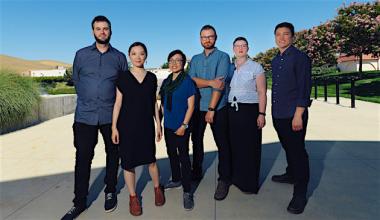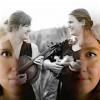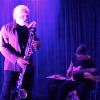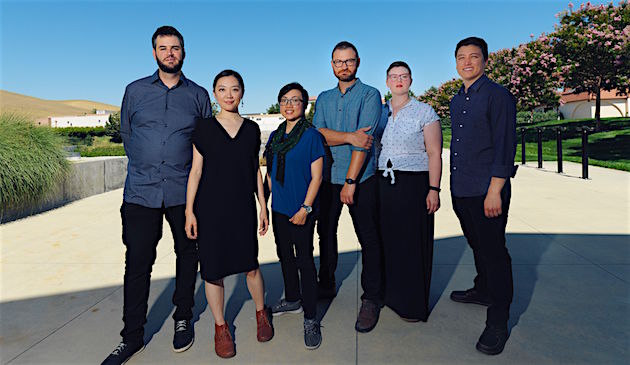
I wasn’t truly “in it” until halfway through. Enjoying myself, certainly, but distracted — taking it all in in pieces, making it hard to parse. However, URSA: an interstellar cantata, the 14-movement collaborative work by L.A. Signal Lab, reaped the benefit of its early seeds by the eighth movement, a graceful setting of Walt Whitman by saxophonist Hitomi Oba. This is where the piece hit its stride, each new text and opening easily into the next, culminating in a multifaceted understanding, a communication from the great astrological bears.
“Cantata” is a fitting word for the whole work, as a combination of storytelling, reflection, morality, and origin stories. The content orbits Ursa Major and Minor — reaching between NASA and Jimmy Carter, to Greek, Japanese, and Inuit myth. After the initial conception by L.A. Signal Lab’s Nick DePinna, Dan Marschak, Noah Meites, and Hitomi Oba, the group approached composer and flutist Erika Oba, librettist Sarah Thomson, and bassist Scott Worthington to join the project. Thomson compiled, arranged, and wrote the texts, providing much of the substantial conceptual backbone.
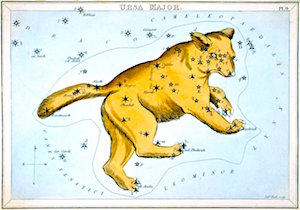
Some awkward features in the first half ended up being welcome in later songs. The tone of the storytelling was overpronounced initially, too much like a children’s story hour. But in later pieces, such as the heartwarming/breaking Inuit legend “The Woman and Her Bear,” the narration gelled with the emotional ebbs and flows in the music. The performance was kicked off by every performer suddenly, inexplicably, saying, “Kilo” in improvised natural-esque random fashion, rhythmically clustering up around each other, a lukewarm improvisation. Small wooden percussion was involved. The effect wasn’t great, at the time. Farther in though, “Kilo” made its triumphant return in my favorite of the pieces: “Maritime Signals,” which had the best text usage in all of URSA.
The piece started with DePinna on concertina and Meites on melodica creating stars together — long unison notes, eerie and shimmering as they wandered to different pitches. Erika Oba on flute superbly executed some of the widest flute pitch bends I’ve heard, an unsettling counterpoint that matched the two speakers. Drawing on maritime flag communication, Hitomi Oba, signing “K” in Semaphore, innocently spoke “Kilo, I wish to communicate with you.” Sarah Thomson replied, “Delta, keep clear of me, I am maneuvering with difficulty.” Hitomi continued to respond with “Kilo” to whatever message of danger Thomson signed back. The ringing foreboding of their lack of communication was amplified by the tinny resonance of the stars around them. Very clever, very affecting.
Movement three, “Telephonic Conversation,” was the only segment that didn’t read well. The text is a silly selection from a story by Mark Twain about the invention of the telephone, which is a promising place to start. It was hampered by a combination of the trite image of all the players looking at their phones, and the fact that we couldn’t hear the text nearly at all. It seems like a link in the chain that could be strengthened in future performances, especially because it happens so early on in the work.
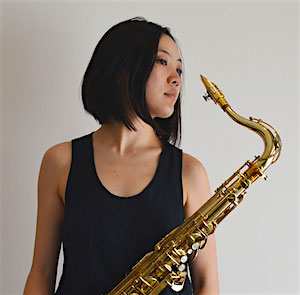
Hitomi Oba’s smoky voice was a gem wherever it arrived. Her song “Youth, Day, Old Age, and Night” was the first to truly immerse me in the language of the evening, though intelligibility of text was not nearly as important as the graceful harmonic swing of the phrases, and the gentle meld of voice, piano, and bass. Noah Meites’s piece “Voyager Golden Record” equally brought me to greater depths. Under a mix of proclamations by Jimmy Carter about Voyager’s mission of communication with “galactic civilizations,” the music — half prerecorded, half improvised — hinted at the problematic depth of trying to collect everything needed to represent the culture of Earth.
I left excited to hear more work like this: large quilts of pieces, through-written shows with ambitious reach. The concept, or constellation, as clearly forged by all, shone through the performance, greater than any one element.

